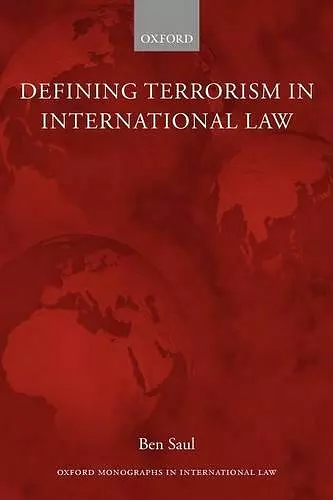Defining Terrorism in International Law
Format:Paperback
Publisher:Oxford University Press
Published:14th Feb '08
Currently unavailable, and unfortunately no date known when it will be back
This paperback is available in another edition too:
- Hardback£120.00(9780199295975)

Despite numerous efforts since the 1920s, the international community has failed to define or criminalize 'terrorism' in international law. This book first explores the policy reasons for defining and criminalizing terrorism, before proposing the basic elements of an international definition. Terrorism should be defined and criminalized because it seriously undermines fundamental human rights, jeopardizes the State and peaceful politics, and may threaten international peace and security. Definition would also help to distinguish political from private violence, eliminating the overreach of the many 'sectoral' anti-terrorism treaties. A definition may also help to confine the scope of UN Security Council resolutions since 11 September 2001, which have encouraged States to pursue unilateral and excessive counter-terrorism measures. Defining terrorism as a discrete international crime normatively recognizes and protects vital international community values and interests, symbolically expresses community condemnation, and stigmatizes offenders. Any definition of terrorism must also accommodate reasonable claims to political violence, particularly against repressive governments, and this book examines the range of exceptions, justifications, excuses, defences, and amnesties potentially available to terrorists, as well as purported exceptions such as self-determination struggles, 'State terrorism', and armed conflicts. While this book seeks to minimize recourse to violence, it recognises that international law should not become complicit in oppression by criminalizing legitimate forms of political resistance. In the absence of an international definition, the remainder of the book explores how the international community has responded to terrorism in international and 'regional' treaties, the United Nations system, and in customary law. The final part of the book explores the distinctive prohibitions and crime of 'terrorism' in armed conflict under international humanitarian law.
This book is a fine example of great scholarship. Saul provides the reader with many references to literature and philosophy, thereby opening up the reader's understanding of terrorism and international law more generally. Undoubtedly, this book deserves to be called 'seminal', for there are no other works that provide such an in-depth examination and analysis of the concept of terrorism. * 29 Legal Studies (2009) *
a study that is highly impressive in its comprehensiveness and depth of analysis. It is this balanced approach and detail of analysis that make this study so valuable and that will undoubtedly establish it as the essential starting point for any further attempts to define terrorism in international law. * Human Rights Law Review (2007) *
This book is immediately recognizable for its thoroughness in research and meticulousness in detail. the usefulness of the book in the overall development of a coherent legal framework for fighting terrorism is assured. * Chinese Journal of International Law (2007) *
Ben Saul's book is an exceptional study of the issue. Despite the fact that many scholars have written extensively on terrorism, this book is exemplary of fine scholarship and deserves a wide readership. Saul's book is erudite, clear, and informative without being turgid. The author makes interesting and stimulating points, thus opening up the reader's horizons to further reflect on the issue. The arguments employed are strengthened by extensive empirical research. Given the persistent disagreement about defining terrorism over many years this book is highly educative. * European Law Journal (2008) *
He deftly addresses one of the trickiest issues in defining terrorism - how to treat asymmetric warfare in self-determination movements. It is quite thorough in its detail making the monograph useful as a reference text. Throughout the monograph, Saul maintains an even-handed tone - even when discussing potentially inflammatory matters such as the Israeli-Palestinian conflict. Saul's monograph lays out a strong case for addressing terrorism on the international level as a crime and presents a coherent framework for doing so. a good start toward making international law relevant to post-9/11 terrorism. * American Journal of International Law (2007) *
One can recommend this book to everyone interested in the problematic of terrorism. * Panstwo I Prawo (Poland) (2008) *
the book provides a sophisticated study of the definition of terrorism in international law. It is a comprehensive and important contribution to the existing literature. * Irish Yearbook of International Law (2006) *
ISBN: 9780199535477
Dimensions: 234mm x 156mm x 23mm
Weight: 642g
416 pages